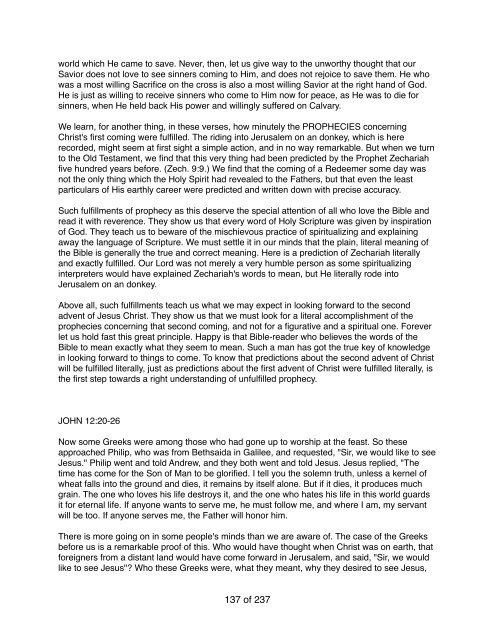J. C. Ryle John
John Charles Ryle (May 10, 1816 - June 10, 1900) was an evangelical Anglican clergyman and first Bishop of Liverpool. He was renowned for his powerful preaching and extensive tracts.
John Charles Ryle (May 10, 1816 - June 10, 1900) was an evangelical Anglican clergyman and first Bishop of Liverpool. He was renowned for his powerful preaching and extensive tracts.
Create successful ePaper yourself
Turn your PDF publications into a flip-book with our unique Google optimized e-Paper software.
world which He came to save. Never, then, let us give way to the unworthy thought that our<br />
Savior does not love to see sinners coming to Him, and does not rejoice to save them. He who<br />
was a most willing Sacrifice on the cross is also a most willing Savior at the right hand of God.<br />
He is just as willing to receive sinners who come to Him now for peace, as He was to die for<br />
sinners, when He held back His power and willingly suffered on Calvary.<br />
We learn, for another thing, in these verses, how minutely the PROPHECIES concerning<br />
Christ's first coming were fulfilled. The riding into Jerusalem on an donkey, which is here<br />
recorded, might seem at first sight a simple action, and in no way remarkable. But when we turn<br />
to the Old Testament, we find that this very thing had been predicted by the Prophet Zechariah<br />
five hundred years before. (Zech. 9:9.) We find that the coming of a Redeemer some day was<br />
not the only thing which the Holy Spirit had revealed to the Fathers, but that even the least<br />
particulars of His earthly career were predicted and written down with precise accuracy.<br />
Such fulfillments of prophecy as this deserve the special attention of all who love the Bible and<br />
read it with reverence. They show us that every word of Holy Scripture was given by inspiration<br />
of God. They teach us to beware of the mischievous practice of spiritualizing and explaining<br />
away the language of Scripture. We must settle it in our minds that the plain, literal meaning of<br />
the Bible is generally the true and correct meaning. Here is a prediction of Zechariah literally<br />
and exactly fulfilled. Our Lord was not merely a very humble person as some spiritualizing<br />
interpreters would have explained Zechariah's words to mean, but He literally rode into<br />
Jerusalem on an donkey.<br />
Above all, such fulfillments teach us what we may expect in looking forward to the second<br />
advent of Jesus Christ. They show us that we must look for a literal accomplishment of the<br />
prophecies concerning that second coming, and not for a figurative and a spiritual one. Forever<br />
let us hold fast this great principle. Happy is that Bible-reader who believes the words of the<br />
Bible to mean exactly what they seem to mean. Such a man has got the true key of knowledge<br />
in looking forward to things to come. To know that predictions about the second advent of Christ<br />
will be fulfilled literally, just as predictions about the first advent of Christ were fulfilled literally, is<br />
the first step towards a right understanding of unfulfilled prophecy.<br />
JOHN 12:20-26<br />
Now some Greeks were among those who had gone up to worship at the feast. So these<br />
approached Philip, who was from Bethsaida in Galilee, and requested, "Sir, we would like to see<br />
Jesus." Philip went and told Andrew, and they both went and told Jesus. Jesus replied, "The<br />
time has come for the Son of Man to be glorified. I tell you the solemn truth, unless a kernel of<br />
wheat falls into the ground and dies, it remains by itself alone. But if it dies, it produces much<br />
grain. The one who loves his life destroys it, and the one who hates his life in this world guards<br />
it for eternal life. If anyone wants to serve me, he must follow me, and where I am, my servant<br />
will be too. If anyone serves me, the Father will honor him.<br />
There is more going on in some people's minds than we are aware of. The case of the Greeks<br />
before us is a remarkable proof of this. Who would have thought when Christ was on earth, that<br />
foreigners from a distant land would have come forward in Jerusalem, and said, "Sir, we would<br />
like to see Jesus"? Who these Greeks were, what they meant, why they desired to see Jesus,<br />
137 of 237




